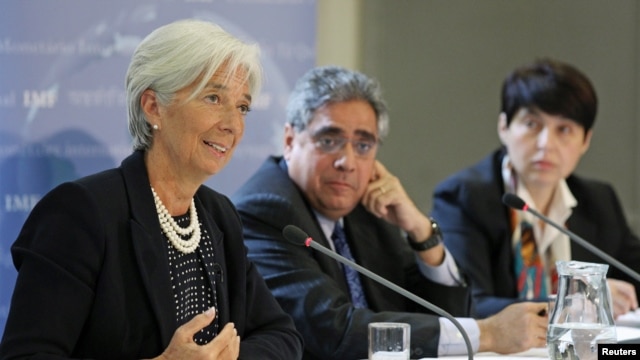IMF's Lagarde Calls for Eurozone Debt Sharing
International Monetary Fund managing director Christine Lagarde (L) speaks at a news conference at the Treasury in London, May 22, 2012.
The chief of the International Monetary Fund is calling for the 17-nation euro currency bloc to accept more liability for each others' debts, but economic powerhouse Germany says it remains adamantly opposed to selling joint eurozone bonds.
IMF Managing Director Christine Lagarde told a London news conference Tuesday that with the economy contracting in the eurozone, more needs to be done to boost its growth and that wealthier countries need to share the burden with their debt-ridden neighbors.
"We consider that more needs to be done, particularly by way of fiscal liability sharing and there are multiple ways to do that," she said. "More needs to be done in relation to supporting growth, particularly by way of structural reforms, certainly not by way of, you know, suggested stimulus because we do not think that the fiscal position of the member states can actually bear that on an aggregate basis."
"So, there is still work under way but we certainly hope that the monetary zone that has been built for the last ten years will continue to be developed, to be strengthened and that the political will of the members will actually be conducive to that effect," she added.
The Organization for Economic Cooperation and Development, representing 34 of the world's largest economies, also called for selling joint bonds. The OECD slashed its forecast for the eurozone economy, predicting it would contract this year by one-tenth of a percentage point, down from the meager two-tenths of a percent growth it had earlier projected.
New French President Francois Hollande is expected to push for the sale of eurobonds when the European Union's 27 leaders meet in Brussels Wednesday.
But Germany, with the eurozone's strongest economy, and other wealthier, northern European countries have been staunchly opposed to such joint financing of eurozone debt. They are fearful that their low borrowing costs would increase sharply if they also were responsible for financing debt-ridden Greece, Italy, Spain and other financially troubled countries.
A senior German official told reporters in Berlin that eurobonds "cannot be part of a growth package."
Austrian Finance Minister Maria Fekter called Hollande's approach "nonsense." She described economic growth financed by more debt "a recipe from the day before yesterday." VOA
IMF Managing Director Christine Lagarde told a London news conference Tuesday that with the economy contracting in the eurozone, more needs to be done to boost its growth and that wealthier countries need to share the burden with their debt-ridden neighbors.
"We consider that more needs to be done, particularly by way of fiscal liability sharing and there are multiple ways to do that," she said. "More needs to be done in relation to supporting growth, particularly by way of structural reforms, certainly not by way of, you know, suggested stimulus because we do not think that the fiscal position of the member states can actually bear that on an aggregate basis."
"So, there is still work under way but we certainly hope that the monetary zone that has been built for the last ten years will continue to be developed, to be strengthened and that the political will of the members will actually be conducive to that effect," she added.
The Organization for Economic Cooperation and Development, representing 34 of the world's largest economies, also called for selling joint bonds. The OECD slashed its forecast for the eurozone economy, predicting it would contract this year by one-tenth of a percentage point, down from the meager two-tenths of a percent growth it had earlier projected.
New French President Francois Hollande is expected to push for the sale of eurobonds when the European Union's 27 leaders meet in Brussels Wednesday.
But Germany, with the eurozone's strongest economy, and other wealthier, northern European countries have been staunchly opposed to such joint financing of eurozone debt. They are fearful that their low borrowing costs would increase sharply if they also were responsible for financing debt-ridden Greece, Italy, Spain and other financially troubled countries.
A senior German official told reporters in Berlin that eurobonds "cannot be part of a growth package."
Austrian Finance Minister Maria Fekter called Hollande's approach "nonsense." She described economic growth financed by more debt "a recipe from the day before yesterday." VOA
Some information for this report was provided by AP.

No comments:
Post a Comment